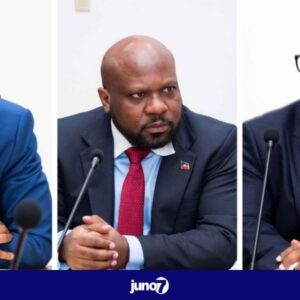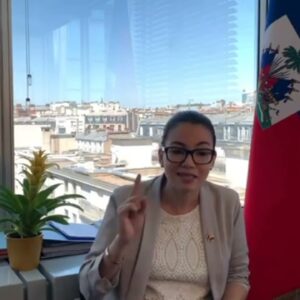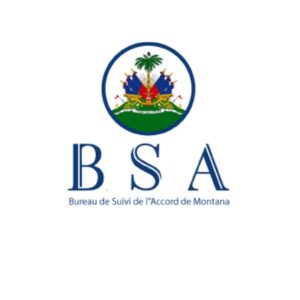Half a dozen men convicted of plotting to assassinate Haitian President Jovenel Moïse must pay his widow and eldest son $6.2 million in compensation for their loss, according to a federal judge’s restitution order in a criminal case in Miami. Although the president was shot by a dozen bullets in the audacious middle-of-the-night attack on his home in the hills above the Haitian capital on July 7, 2021, his widow survived and was airlifted to the Jackson Memorial Hospital to receive treatment for her injuries.
Martine Moïse, 50, received $5,305,387 from US federal judge Jose Martinez for her hospital expenses, travel and security costs she incurred upon her return to Haiti ten days later. His restitution was agreed to jointly by federal prosecutors and defense attorneys after lengthy negotiations.
Although Martine Moïse and her representatives claimed she was injured in the arm, her injuries have long been a source of debate in Haiti, where she was charged earlier this year in the death of her husband, along with 50 others. , some of whom were close to the assassinated president. The late president’s eldest son, Joverlein Moïse, who lives in Quebec, Canada, received $865,396.
The judge’s order does not specify why the six convicted defendants were ordered to compensate the son, who was not home at the time of the killing. The son filed a request with a court in Port-au-Prince to join the investigation, which, under French law in force in Haiti, allows a person harmed by a crime to seek damages from the authors.
It remains to be seen how much the president’s widow and eldest son will receive from the six people ordered to pay restitution for the death of the 53-year-old Haitian leader, as only one of the men is known to have any assets. There’s also a touch of irony in the federal judge’s restitution order: Although U.S. authorities consider Martine Moïse a “victim” in her husband’s fatal shooting in Haiti, she is accused of playing a role in the assassination plot.
Martine Moïse’s South Florida lawyer, Paul Turner, called a Haitian magistrate’s allegations “nonsense” and “politically motivated,” saying she had no “prior knowledge ” of the assassination. In the restitution agreement filed last week in a Miami federal court, Martinez did not identify the widow and eldest son in his final ruling. They are referred to as “Victim 1” and “Victim 2”. However, the Miami Herald has learned from the widow’s lawyer that Martine Moïse is the first victim; other people familiar with the matter say Joverlein Moses is the second.
Turner said he provided the team of federal prosecutors with receipts for the widow’s medical treatment at Jackson Memorial Hospital as well as other expenses for her travel and security, calling the restitution amount a “compromise “.
Turner added that he and Martine Moïse, who currently lives in South Florida, were grateful that a deal was reached between prosecutors and defense attorneys rather than her being forced to testify about the hospital bills and other expenses at a hearing before a federal judge in Miami.
“We’re glad we didn’t have to do it,” Turner told the Herald. “We didn’t want to fight about it, and she didn’t want to go to court.” It is still unclear what overdue hospital payments Martine Moïse incurred.
Documents obtained by the Miami Herald show that the Haitian government, in the days following the assassination, spent more than $330,000 on medical care and private air transportation for the family.
On July 7, the Haitian embassy in Washington transferred $100,000 to a Citibank account for the Haitian consulate in Miami for the first lady’s medical expenses. A separate letter from the Haitian Ministry of Foreign Affairs, addressed to the U.S. Embassy in Port-au-Prince, confirmed the transfer of funds and clarified that it was intended to support the First Lady’s airlift.
The Haitian embassy in Washington, which has been plagued by a financial corruption scandal, also issued a series of three checks, for $22,000, $22,875 and $27,940, between July 7 and July 9, to allow the presidential family to take a charter flight from Port-au-Prince to Miami.
On July 26, the Haitian embassy transferred an additional $105,950 to the Citibank account of the Haitian consulate in Miami. Again, the United States Embassy in Port-au-Prince was informed of the bank transfer. This time, the Haitian Ministry of Foreign Affairs stated that “the funds will be used to cover medical costs related to Jackson Memorial Hospital.
“A letter from Jackson was attached, stating that the “deposit will be collected to cover the $105,950 medical expenses of the Miami Consulate of Haiti.”
Two days after Jackson Memorial received that money, the Haitian embassy wrote a check for $59,100 for another charter flight for the presidential family. Again, the United States Embassy was informed in separate correspondence of the transaction.
When Martine Moïse returned to Haiti for her husband’s funeral on July 23, she stepped off the plane at the Port-au-Prince airport wearing a black dress, a black bulletproof vest, with a black mask and with his right arm in a black scarf.
The widow and her late husband had two other children who were at their home during the attack almost three years ago but were not injured.
They are represented by their mother in a separate lawsuit filed last year against the 11 defendants named in the criminal indictment filed in Miami federal court. Turner said the civil case, which seeks separate damages for her late husband’s loss of income, emotional distress and other claims, is on hold pending the outcome of the case criminal. The other five defendants in the criminal case are scheduled to go to trial next January.
Asked about the difficulty of recovering damages from 11 defendants, Turner acknowledged the difficulty and said he hoped to eventually add other defendants with deeper pockets to the suit.
Over the past two years, a half-dozen men have pleaded guilty in the Miami case, which is based on a violation of U.S. neutrality law and a conspiracy to kill a foreign leader.
Prosecutors say the plot revolved around planning in South Florida and Haiti, with the initial goal of replacing Moïse with a Haitian doctor and pastor, Christian Emmanuel Sanon, and deploying former Colombian soldiers to carry out the assassination of the president.
The six defendants convicted so far are: Rodolphe Jaar, a Haitian-Chilean businessman already convicted of drug trafficking in a Miami federal court; Joseph Joël John, a former Haitian senator; Joseph Vincent, a Haitian-American who worked as an informant for the Drug Enforcement Administration; Germán Alejandro Rivera Garcia, aka “Colonel Mike”, a former Colombian military officer who led the commando squad; and Mario Antonio Palacios Palacios, a former Colombian soldier recruited by Rivera.
These five defendants were sentenced to life imprisonment, but they are cooperating with federal prosecutors and the FBI in hopes of receiving a reduced sentence.
Last month, a sixth defendant, Frederick Bergmann, was sentenced to nine years in prison for violating federal laws designed to prevent the United States from participating in foreign conflicts. A Tampa resident, he was sentenced to one year less than the maximum for shipping ballistic vests to Haiti that were used by Colombian commandos in the deadly attack on the president.
Bergmann had no idea the vests were going to be used in the conspiracy to kill the Haitian president, according to federal prosecutors and his defense attorney. This is why he was not charged for the conspiracy against Moïse.
The other five defendants, including Sanon, are accused of plotting in South Florida to kill the Haitian leader. The conspiracy charge is punishable by life imprisonment.
The defendants awaiting trial are: Antonio “Tony” Intriago, the manager of a Miami-area security company, Counter Terrorist Unit Security, or CTU; Arcángel Pretel Ortiz, who was a former FBI informant when he joined Intriago at CTU; Walter Veintemilla, a Broward County financier; James Solages, a Haitian-American; and Sanon, who was initially seen by the group as a successor to Moïse as president of Haiti.
In February, after Haitian authorities named him an “intellectual plotter” in their case, Sanon was indicted in Miami along with the others for plotting to kill the Haitian leader, after initially being accused of attempt to lead a military expedition against a foreign country. It was the fifth indictment filed by prosecutors Andrea Goldbarg, Monica Castro and Frank Russo.
Martine Moïse should be a “key witness” for the federal government during the next trial, according to her lawyer.
With Miami Herald








